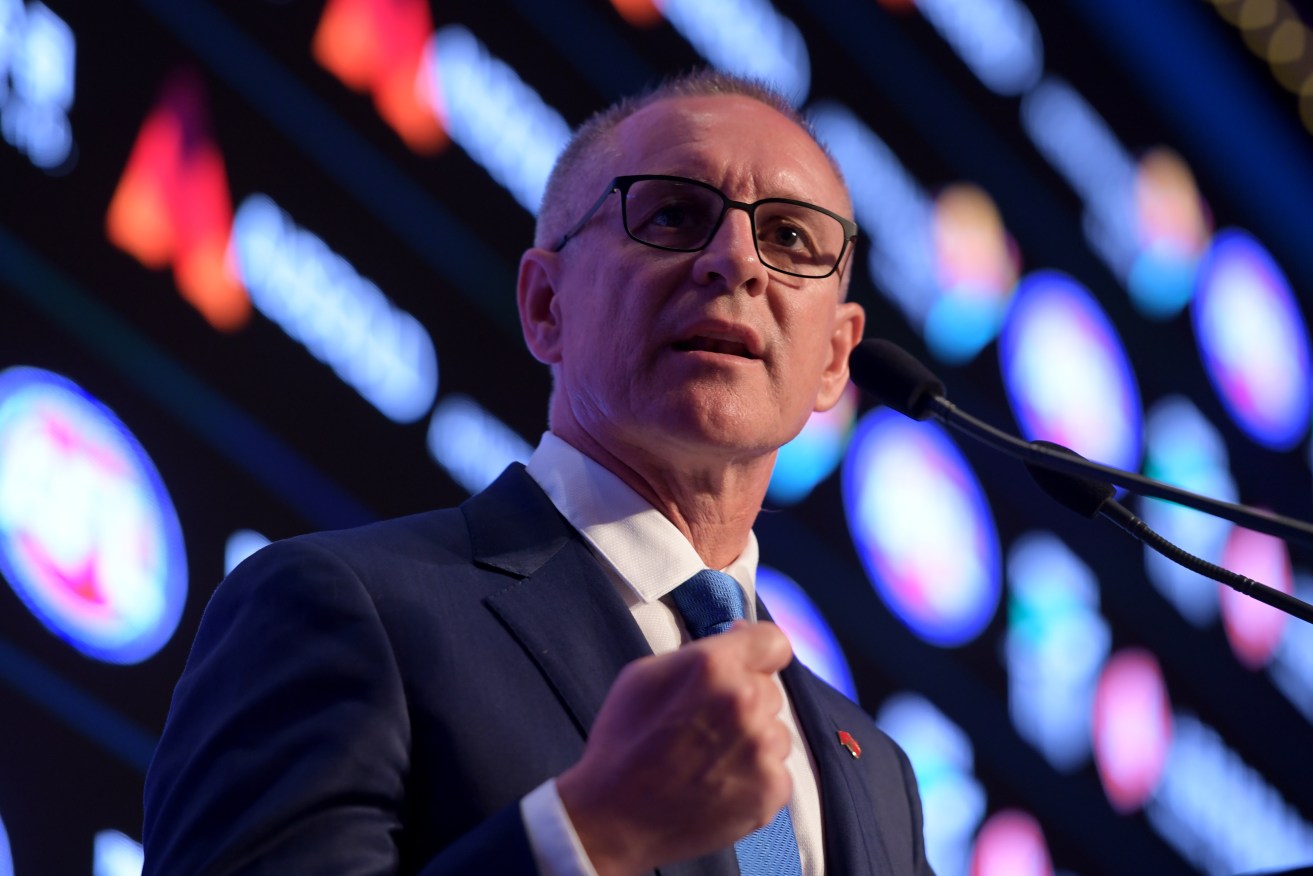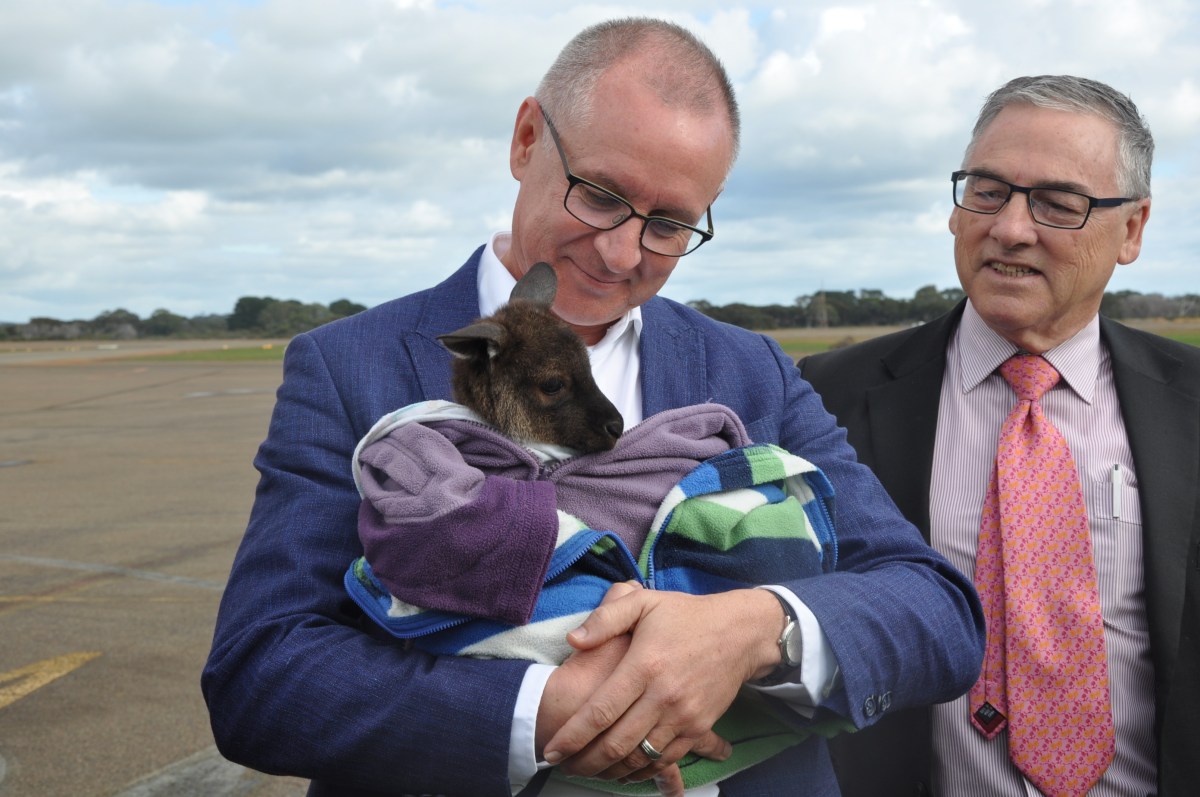Richardson: Jay’s conviction politics is just more spin
Jay Weatherill’s abandonment of his nuclear dream leaves him with next to nothing to show for the ‘bold’ policy vision he outlined more than two years ago. And, writes Tom Richardson, it fatally undermines his pretence of being a politician of conviction.

Jay Weatherill speaking in Shanghai last month. Photo: Tracey Nearmy / AAP
When Jay Weatherill became his party’s consensus candidate to replace long-serving leader Mike Rann, it was largely on account of his ability to sell himself as a politician of conviction.
It seemed a marked contrast to the unashamedly populist bent of his predecessor, but after a near-decade of Labor rule, it was felt that the spin had worn thin and that South Australian voters craved something akin to what George Bush Snr famously called ‘the vision thing’.
Ironically, of course, Weatherill’s re-election in 2014 was largely achieved on the back of Rann’s own vision, with a new hospital and a revamped Adelaide Oval the selling points underpinning Labor’s ‘let’s keep building South Australia’ mantra.
And it was Jay’s unadorned style and his penchant for picking moments rich with symbolism – such as standing up to his party’s ‘faceless men’ by thwarting Don Farrell’s bid for a safe seat – that helped him stamp his own imprint onto Labor’s repackaged brand.
It was not until after re-election was secured that he set about outlining his new agenda.
It should be remembered that he did so in the context of the damaging fallout of the Gillman land deal, which he shrugged off as nothing more than an unorthodox bid to do something “bold” in order to secure jobs for SA.
“You haven’t seen anything yet,” he declared in an interview on ABC Radio Adelaide.
“We are going to be putting in front of South Australians some very big changes which I think will cause them to gasp a little.”
Lest we forget, the blueprint for this self-proclaimed “bold” agenda was contained in a speech by Governor Hieu Van Le to open the new parliamentary session in early 2015.
The key elements therein were a commitment to consider wholesale reform of the SA taxation regime, a proposal to change South Australia’s time zone, health sector reform via the Transforming Health plan and a Royal Commission to consider boosting South Australia’s role in the nuclear fuel cycle.
The latter, effectively the centrepiece of Weatherill’s pledge to take away our collective breath, was deliberately designed to legitimise a plan to establish a high-level nuclear waste repository in SA, a proposal for which key figures within the Government were already arguing.
On the face of it, all this is evidence of Weatherill as a Conviction Politician.
A politician prepared to risk controversy in the pursuit of policy that they believe is right.
A Jeremy Corbyn type, perhaps.
A reappraisal of Weatherill’s post-election term in office suggests the commitment to ‘courage’ was all part of the spin.
The philosophical underpinnings of Weatherill’s political strategy were – I think unwittingly – revealed in a strange interview he did with me last year, in which he insisted that voters would ultimately reward his political bravery.
“There’s political risk and political reward [and] it takes some courage to prosecute your ideas and defend them,” he said at the time.
“What we need at the moment is people to take political risks… the nuclear fuel cycle royal commission’s got political risk written all over it [but] we haven’t shirked any of the big public policy questions.
“I think ultimately people will give credit to people that are taking on the big decisions.”
He may be right.
But a reappraisal of his post-election term in office – which ends in nine months’ time – suggests the commitment to “courage” was all part of the spin.
Labor courageously squibbed on tax reform, after floating a broad-based land tax while scrapping stamp duty, which its own discussion paper deemed “one of the least efficient taxes levied by the state”.
The it bravely ran away from a battle with Upper House crossbenchers on a time zone change, happily vindicating the many cynics who had long deemed the flight of fancy a ‘look over there’ distraction from the state’s mounting jobless woes.
Of the bold agenda, only the waste dump remained on the table. And when the Liberals late last year – in their own nakedly populist political gambit – withdrew their support for further debate on the issue, Weatherill’s leadership came under intense pressure.
If he bowed to the Liberals – and the fruits of his Citizens’ Jury own-goal – it would have been his Emporer’s New Clothes moment; the moment his self-hyped bold agenda was revealed as nothing more than so much sound and fury.
But charged with the impossible task of carrying his own party dissidents along with him, he devised a face-saving exit plan.
He declared that the fight would continue; all was not lost.
The dream remained alive.
As he did when he announced a Royal Commission, he invoked a major political event – a referendum.
He was coy about the timing, but he declared: “I believe continued public debate about SA’s role in the nuclear fuel cycle is important and ultimately it is a matter that the people should decide, not political parties.”
“I am supportive of continued debate on this issue – I am not supportive of shutting down democracy… the only path forward is the restoration of bipartisanship and broad social consent.”
Weatherill this week insisted his political rhetoric around the waste dump was entirely consistent with his previous position, but that is nonsense. It is light years away from his rhetorical stance when he announced a future referendum.
I don’t doubt now that the plan all along was to quietly remove the nuclear millstone that he had tied around his own neck.
But it was not until he this week declared the plan “dead” and declared that he would not pursue it if he wins another term of office that he formally dumped the dump.
Politically, perhaps he had no choice.
But it leaves his blueprint for a ‘bold’ policy vision in tatters, with only John Rau’s planning reforms and Jack Snelling’s troubled Transforming Health regime as selling points for another overspruiked and under-delivered Labor platform.

Jay Weatherill has managed to portray himself as the soft and fluffy face of conviction politics. Photo: Marnie Banger / AAP
Should we doubt that Weatherill’s rhetorical shift was anything but deliberate?
After all, if he felt it was consistent with his previous position, that was news to thousands of anti-dump activists who celebrated at the news that the Premier had declared it dead.
And moreover, this Government has long been happy to let misinformation fester.
SAFECOM chief Malcolm Jackman this week lamented in a parliamentary committee that the removal of the 50 per cent remission the Government traditionally paid on Emergency Services Levy bills had “led the public to believe the ESL had risen dramatically when in fact it hadn’t, but the cost to the taxpayer did”.
Jackman reportedly told the committee: “Reports suggesting that because there had been no significant bushfires over the summer of 2016-17 meant there should be a dramatic reduction in the ESL showed a complete lack of understanding of the day-to-day operation workload of the CFS, MFS and SES.”
“Unfortunately this fake news is disseminated by what the general public would consider credible sources.”
It sure was – it was disseminated by the State Government!
It was the Government that invoked the spectre of successive bushfires as a drain on resources, and it was the Government that repeated ad nauseum its mantra that “every cent of the ESL goes directly to emergency services”.
Which is, and was always, true. But every cent of the extra impost on punters frees up the equivalent amount of general revenue to boost the budget’s bottom line.
And, just as with the ESL, Weatherill has been happy to let the notion that the waste dump is alive and well – albeit on the backburner – fester in the public consciousness.
Until he quietly, finally, put it out of his own misery this week.
The announcement was, I think, historic – but not just because it ended the nuclear debate for the foreseeable future.
It was the moment the veneer of Conviction Politics in SA was lifted.
Weatherill may be a master of political symbolism – his hijacking of Josh Frydenberg’s energy press conference earlier this year, a masterpiece of political brinkmanship, was a case in point.
But his pretence to being a politician of policy substance appears to be all part of the spin.
Rather, the pursuit of policy facilitates his ability to badge himself as ‘brave’ and ‘bold’ – rather than delivering an outcome in and of itself.
And as such, we find ourselves now in much the same position as we were when, six years ago, Labor replaced one leader with another: in a policy vacuum, with the accompanying spin wearying increasingly thin.
Tom Richardson is a senior reporter at InDaily.




